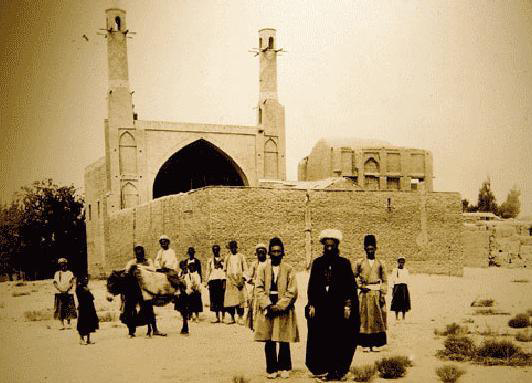The views expressed in our content reflect individual perspectives and do not represent the authoritative views of the Baha'i Faith.
The seen is the changing, the unseen is the unchanging. – Plato
He who rejects change is the architect of decay. The only human institution which rejects progress is the cemetery. – Harold Wilson
Religion will not regain its old power until it can face change in the same spirit as does science. – Alfred North Whitehead
The religion of God is one religion, but it must ever be renewed. – Abdu’l-Baha
Religious truth, Baha’is believe, is not fixed—it is relative. Every religion has essential laws, which remain true throughout history—the existence of God, the necessity of prayer, the principles of spirituality and morality like the Golden Rule. But every religion also has changeable material laws:
In brief, every one of the divine religions contains essential ordinances, which are not subject to change, and material ordinances, which are abrogated according to the exigencies of time. – Abdu’l-Baha, The Promulgation of Universal Peace, p. 106.
In John 15:26, when Christ said “I have yet many things to say unto you, matters needing to be told, but ye cannot bear to hear them now,” he referred directly to this fundamental concept. When we’re children, our understanding is limited. When we mature and become adults, our understanding grows and expands, which means we can comprehend much more than before. In the same way, humanity itself grows and matures. We have knowledge today that would have seemed miraculous and magical even a few decades ago. The laws and principles that were valid and constructive in Christ’s time have now been supplanted by laws and principles more suited to this contemporary age.
Change, then, comes to all individuals, all cultures, and all Faiths. Religions themselves take part in that inevitable cycle of change, being born, growing and then declining like all living things:
From the days of Adam until today, the religions of God have been made manifest, one following the other, and each one of them fulfilled its due function, revived mankind, and provided education and enlightenment. They freed the people from the darkness of the world of nature and ushered them into the brightness of the Kingdom. As each succeeding Faith and Law became revealed it remained for some centuries a richly fruitful tree and to it was committed the happiness of humankind. However, as the centuries rolled by, it aged, it flourished no more and put forth no fruit, wherefore was it then made young again.
The religion of God is one religion, but it must ever be renewed. Moses, for example, was sent forth to man and He established a Law, and the Children of Israel, through that Mosaic Law, were delivered out of their ignorance and came into the light; they were lifted up from their abjectness and attained to a glory that fadeth not. Still, as the long years wore on, that radiance passed by, that splendour set, that bright day turned to night; and once that night grew triply dark, the star of the Messiah dawned, so that again a glory lit the world.
Our meaning is this: the religion of God is one, and it is the educator of humankind, but still, it needs must be made new. – Abdu’l-Baha, Selections from the Writings of Abdu’l-Baha, p. 51.
When the Baha’i Faith began, it did so in an Islamic culture, the Shi’a Muslim civilization of 19th Century Persia. That six hundred year old Islamic society, governed by a dynastic Qajar monarchy, upheld the rigid traditions of Sharia law. Baha’u’llah’s revelation controversially abrogated Sharia canon law, supplanting it with a much more progressive, equality-based system, which created an enormous upheaval in Persia and the surrounding areas.

Isfahan, Qajar Era circa 1900
Tens of thousands of people rapidly became Baha’is, threatening the established order with their sheer numbers. The Muslim clergy considered this new Faith as an apostasy, and ordered the destruction of the Baha’is. Twenty thousand died at the hands of Muslim fanatics and the state. When the genocide failed to stop the growth of the Baha’i Faith, the clerics recommended the death penalty for Baha’u’llah. Instead, the Shah decided to exile Baha’u’llah, his family and his followers to other parts of the Ottoman Empire, hoping that they would die along the way, or in the Empire’s foul prisons.
For attempting to change the status quo, for delivering to humanity the principles of a new Faith, Baha’u’llah suffered forty years of exile, imprisonment and torture. This kind of terrible, cruel treatment, visited upon every prophet of God who brings a new code of spiritual law to humanity, shows the strong human resistance to change. It also shows that we can change, if we focus on the spiritual and not the traditional, material aspects of our beliefs.
No system of religious law, the Baha’i teachings say, lasts forever. Religion must change in every new revelation:
Everything in the world is subject to change. But this transmutation and change are requirements of life. See, for instance, these flowers before us. They come forth from a seed. They grow to perfection, but when they have reached the state of perfection they go back again. This is the invariable law of creation. Likewise man develops until he has grown to maturity. When he reaches beyond the state of maturity he begins to decline. All religions of God are subject to this same law. They are founded in order to blossom out and develop and fulfil their mission. They reach their zenith and then decline and come to an end. So a few thousand years ago came Moses. He promulgated the ten commandments. Later these laws were changed, and this change was so complete that of the original nothing more was visible. Then God sent the Roman Empire to destroy the Holy Land, because the Jews had forgotten the law of God. They had in the end only a bundle of superstitions. When this religion had sunk to such a depth, God sent his Holiness Jesus Christ. His Holiness Christ appeared as the Light of the Sun, and He founded anew the religion of God. He revivified the light which had been given by Moses and fulfilled that law.
This should show you that religion is subject to change. – Abdu’l-Baha, Star of the West, Volume 3, p. 68.
So, yes, religion changes. It goes through a cycle of maturation, and when it reaches the end of its usefulness and power, its decline makes way for the growth of a new Faith with new laws suited to the new era.

















Comments
Sign in or create an account
Continue with Facebookor